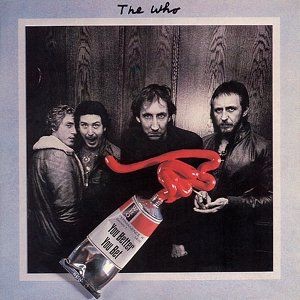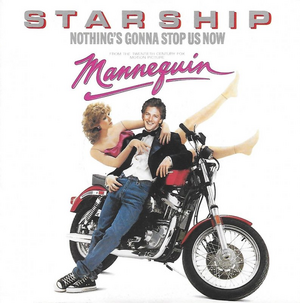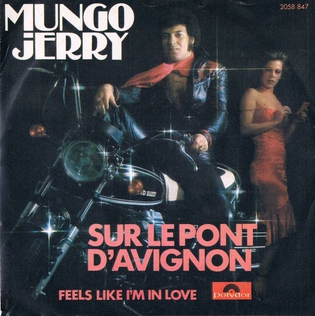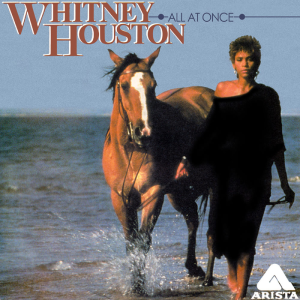
"Crazy Little Thing Called Love" is a song by the British rock band Queen. Written by Freddie Mercury in 1979, the track is included on their 1980 album The Game, and also appears on the band's compilation album Greatest Hits in 1981. The song peaked at number two in the UK Singles Chart in 1979 and became the group's first number-one single on the Billboard Hot 100 in the US in 1980, remaining there for four consecutive weeks. It topped the Australian ARIA Charts for seven weeks. It was the band's final single release of the 1970s.

"Funkytown" is a song by American disco-funk group Lipps Inc., written and produced by Steven Greenberg and released by Casablanca Records in March 1980 as the second single from the group's 1979 debut studio album Mouth to Mouth.

Greatest Hits is a compilation album by the British rock band Queen, released worldwide on 26 October 1981. The album consisted of Queen's biggest hits since their first chart appearance in 1974 with "Seven Seas of Rhye", up to their 1980 hit "Flash". There was no universal track listing or cover art for the album, and each territory's tracks were dependent on what singles had been released there and which were successful. In 1992, the US version of the album Classic Queen was released following the band's rekindled popularity in the nation.

Greatest Hits is a greatest hits album by British-American rock band Fleetwood Mac, released on 21 November 1988 by Warner Bros. Records. It covers the period of the band's greatest commercial success, from the mid-1970s to the late-1980s.

"Super Trouper" is a song by the Swedish pop group ABBA, and the title track from their 1980 studio album of the same name, written by Benny Andersson and Björn Ulvaeus. It was released in November 1980 as the album's third single, reaching number one in several countries. It was the group's ninth and final number one on the UK Singles Chart and the fourth best-selling single in the UK that year, selling over 700,000 copies in that country alone.

"One Day in Your Life" is a song recorded by American singer Michael Jackson for his 1975 album, Forever, Michael. Music written by Sam Brown III and lyrics by Renée Armand, it was later released on March 20, 1981 as a single from the compilation album One Day in Your Life due to the commercial interest that generated from the sales of Jackson's hit 1979 album Off the Wall, despite the fact that Jackson had released that album on Epic Records instead of Motown.

"You Better You Bet" is a song by British rock band The Who, appearing as the first track on their 1981 album Face Dances. It is sung by frontman Roger Daltrey with backing vocals from Pete Townshend and bassist John Entwistle.

"Somebody to Love" is a song by the British rock band Queen, written by lead singer and pianist Freddie Mercury. It debuted on the band's 1976 album A Day at the Races and also appears on their 1981 compilation album Greatest Hits.

"Celebration" is a 1980 song by American band Kool & the Gang. Released as the first single from their twelfth album, Celebrate! (1980), it was the band's first and only single to reach No. 1 on the US Billboard Hot 100. In 2016, the song was inducted into the Grammy Hall of Fame.

Russell Glyn Ballard is an English rock singer, guitarist, songwriter and producer. Originally rising to prominence as the lead singer and guitarist of the band Argent, Ballard became a prolific songwriter and producer by the late 1970s. His compositions "New York Groove", "You Can Do Magic", "Since You Been Gone", "I Surrender", "Liar", "Winning", "I Know There's Something Going On", "Can't Shake Loose", "So You Win Again" and "God Gave Rock and Roll to You" became hits for other artists during the 1970s and 1980s. He also scored several minor hits under his own name in the early and mid-1980s.

"Nothing's Gonna Stop Us Now" is a song co-written by Diane Warren and Albert Hammond and recorded by American rock band Starship for their second studio album, No Protection (1987). It is a power ballad duet featuring vocalists Grace Slick and Mickey Thomas and is the theme to the romantic-comedy film Mannequin.

"Feels Like I'm in Love" is a song written and recorded by Ray Dorset with his band Mungo Jerry. It was a number-one hit on the UK Singles Chart for two weeks in September 1980 for Scottish singer Kelly Marie.

"Nothing's Gonna Change My Love for You" is a song written by composer Michael Masser and lyricist Gerry Goffin. It was originally recorded by American singer and guitarist George Benson for his 1985 studio album 20/20, released by Warner Bros. Records. This original version was produced by co-writer Masser, and was released as a single in Europe only in 1985. In 1987, Hawaii born singer Glenn Medeiros released a version, which became a worldwide success.

McVicar is a British drama film released in 1980 by The Who Films, Ltd., starring Roger Daltrey of the Who playing the 1960s armed robber and later writer John McVicar.

"Let Your Love Flow" is the debut single by country music duo the Bellamy Brothers, recorded in late 1975 and released in January 1976. The song was written by Larry E. Williams and produced by Phil Gernhard and Tony Scotti. It became an international hit, reaching number one in several countries including the United States and Germany, while reaching the top ten in at least nine others including the United Kingdom and Australia.

McVicar is the soundtrack to the film McVicar and the fourth solo studio album by Roger Daltrey, the lead vocalist for the Who. The film, a biopic of the English bank robber John McVicar, was produced by Daltrey and also featured him in the starring role as John McVicar himself. All of the then-members of the Who played on the album.

"All at Once" is a song by American singer Whitney Houston from her self-titled debut album. The song was released in March 1985 by Arista Records as a single in several European countries, as well as in Japan in 1985–1986. It was not released as a single in North America, but did receive steady radio airplay on pop and R&B stations there. The song is a ballad about a love who leaves without warning and the heartbreak that is felt afterwards. It was written by Michael Masser and Jeffrey Osborne and produced by Masser.

"Freeze-Frame" is a song written by Seth Justman and Peter Wolf for the J. Geils Band. It was first released as the opening track on the chart-topping 1981 album of the same name. The song was released on a 45 in early 1982 as the second single from the album, following the million-selling US #1/UK #3 hit "Centerfold". The single's flip side, "Flamethrower", received airplay on urban contemporary radio stations throughout the United States, and reached #20 on the Billboard Soul Chart.

"Your Love Still Brings Me to My Knees" is a song originally recorded by British artist Dusty Springfield and released in the UK in early 1980. It was her last single release on the Mercury label, but failed to reach the UK charts, despite heavy radio airplay. It was later recorded by American-Australian singer Marcia Hines. The song was written by Bobby Wood, Roger Cook and produced by David Mackay and released in July 1981 as the lead single from Hines' fifth studio album, Take it From the Boys (1981). It became Hines' sixth Top 10 single in Australia. Later versions were recorded by The Duncans also in 1981 and Leo Sayer in 1982.

"Sacramento (A Wonderful Town)" is a song by Scottish band Middle of the Road, released as a single in November 1971. It peaked at number 23 on the UK Singles Chart, showing the band's decline in popularity in the UK. However, elsewhere, the band continued their success in Europe, topping the charts in several countries.




















